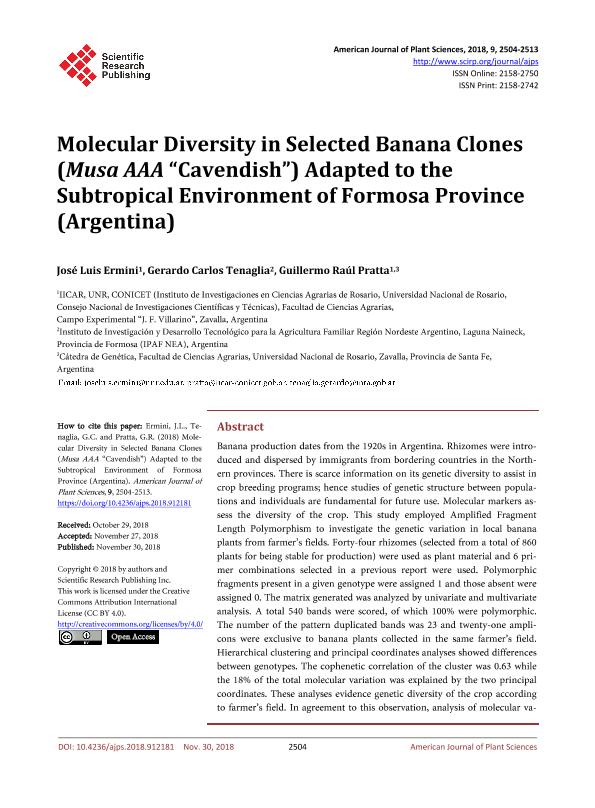Mostrar el registro sencillo del ítem
dc.contributor.author
Ermini, José Luis

dc.contributor.author
Tenaglia, Gerardo Carlos

dc.contributor.author
Pratta, Guillermo Raúl

dc.date.available
2019-11-01T17:35:53Z
dc.date.issued
2018-11
dc.identifier.citation
Ermini, José Luis; Tenaglia, Gerardo Carlos; Pratta, Guillermo Raúl; Molecular Diversity in Selected Banana Clones (Musa AAA “Cavendish”) Adapted to the Subtropical Environment of Formosa Province (Argentina)
; Scientific Research Publishing; American Journal of Plant Sciences; 9; 12; 11-2018; 2504-2513
dc.identifier.issn
2158-2742
dc.identifier.uri
http://hdl.handle.net/11336/87821
dc.description.abstract
Banana production dates from the 1920s in Argentina. Rhizomes were introduced and dispersed by immigrants from bordering countries in the Northern provinces. There is scarce information on its genetic diversity to assist in crop breeding programs; hence studies of genetic structure between populations and individuals are fundamental for future use. Molecular markers assess the diversity of the crop. This study employed Amplified Fragment Length Polymorphism to investigate the genetic variation in local banana plants from farmer?s fields. Forty-four rhizomes (selected from a total of 860 plants for being stable for production) were used as plant material and 6 primer combinations selected in a previous report were used. Polymorphic fragments present in a given genotype were assigned 1 and those absent were assigned 0. The matrix generated was analyzed by univariate and multivariate analysis. A total 540 bands were scored, of which 100% were polymorphic. The number of the pattern duplicated bands was 23 and twenty-one amplicons were exclusive to banana plants collected in the same farmer?s field. Hierarchical clustering and principal coordinates analyses showed differences between genotypes. The cophenetic correlation of the cluster was 0.63 while the 18% of the total molecular variation was explained by the two principalcoordinates. These analyses evidence genetic diversity of the crop accordingto farmer?s field. In agreement to this observation, analysis of molecular variance revealed that 8.9% of the variation was found among farmer populations and 91.1% within farmer populations. In conclusion, introduction of banana into the subtropical zone was associated with a broader genetic variation in order to increase the genetic homeostasis necessary for adapting the crop to the suboptimal environment of Northeastern Argentinean Formosa Province.
dc.format
application/pdf
dc.language.iso
eng
dc.publisher
Scientific Research Publishing
dc.rights
info:eu-repo/semantics/openAccess
dc.rights.uri
https://creativecommons.org/licenses/by/2.5/ar/
dc.subject
AGRONOMY BIODIVERSITY
dc.subject
AUTOTRIPLOIDY
dc.subject
MOLECULAR CHARACTERIZATION
dc.subject
MULTIVARIATE ANALYSIS
dc.subject
PLANT GENETIC RESOURCES
dc.subject.classification
Otras Agricultura, Silvicultura y Pesca

dc.subject.classification
Agricultura, Silvicultura y Pesca

dc.subject.classification
CIENCIAS AGRÍCOLAS

dc.title
Molecular Diversity in Selected Banana Clones (Musa AAA “Cavendish”) Adapted to the Subtropical Environment of Formosa Province (Argentina)
dc.type
info:eu-repo/semantics/article
dc.type
info:ar-repo/semantics/artículo
dc.type
info:eu-repo/semantics/publishedVersion
dc.date.updated
2019-10-23T20:58:30Z
dc.identifier.eissn
2158-2750
dc.journal.volume
9
dc.journal.number
12
dc.journal.pagination
2504-2513
dc.journal.pais
Estados Unidos

dc.description.fil
Fil: Ermini, José Luis. Consejo Nacional de Investigaciones Científicas y Técnicas. Centro Científico Tecnológico Conicet - Rosario. Instituto de Investigaciones en Ciencias Agrarias de Rosario. Universidad Nacional de Rosario. Facultad de Ciencias Agrarias. Instituto de Investigaciones en Ciencias Agrarias de Rosario; Argentina
dc.description.fil
Fil: Tenaglia, Gerardo Carlos. Instituto Nacional de Tecnología Agropecuaria; Argentina
dc.description.fil
Fil: Pratta, Guillermo Raúl. Consejo Nacional de Investigaciones Científicas y Técnicas. Centro Científico Tecnológico Conicet - Rosario. Instituto de Investigaciones en Ciencias Agrarias de Rosario. Universidad Nacional de Rosario. Facultad de Ciencias Agrarias. Instituto de Investigaciones en Ciencias Agrarias de Rosario; Argentina
dc.journal.title
American Journal of Plant Sciences
dc.relation.alternativeid
info:eu-repo/semantics/altIdentifier/url/https://www.scirp.org/journal/paperinformation.aspx?paperid=88868
dc.relation.alternativeid
info:eu-repo/semantics/altIdentifier/doi/http://dx.doi.org/10.4236/ajps.2018.912181
Archivos asociados
